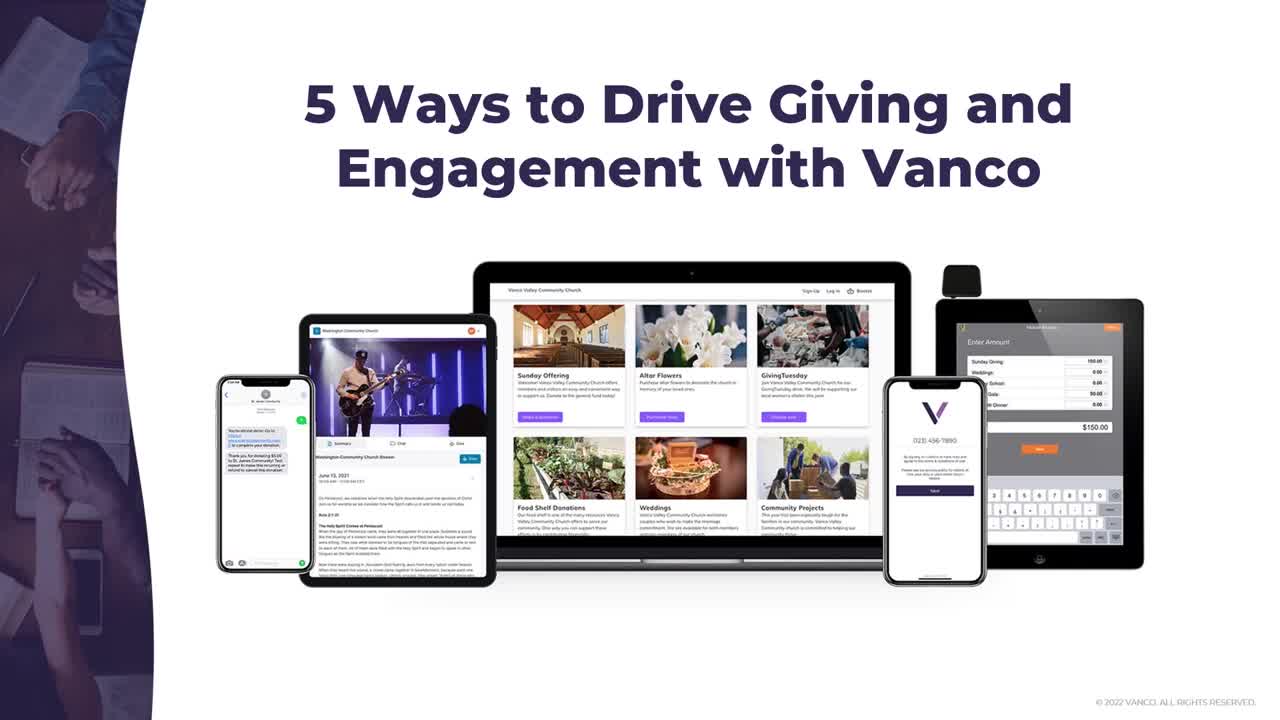
You have a vision for a church that changes lives. But before you hold your first service, there are realities to tackle: church incorporation, tax-exempt status and nonprofit governance best practices. How do you navigate state-specific nonprofit laws, file the proper forms and build a legally recognized faith-based organization?
This guide simplifies the church incorporation process, showing you how to avoid pitfalls and ensure your ministry thrives. Ready to transform your vision into reality? This article will explain how to start a church, ensuring no stone is left unturned.
Table of Contents
- What Are the Legal Requirements to Start a Church?
- How Do I Create a Strong Foundation for My New Church?
- What Steps Are Involved in Launching a New Church Plant?
- Valuable Tools for Starting Your Church
- How Can I Ensure My Church Qualifies for Tax-Exempt Status?
- What Are the Financial Considerations When Starting a Church?
- How Do I Grow and Sustain My New Church?
- How to Start a Church FAQs
Too Busy to Read? Listen to the Key Takeaways
Get the key takeaways by clicking to listen the podcast summary now!
What are the Legal Requirements to Start a Church?

There are various legal requirements on how to start a religious organization. This section will review how to start a church legally, ensuring that your church meets current rules and regulations.
How to Incorporate Your Church as a Nonprofit
Incorporating your church for 501(c)(3) nonprofit status is essential. It gives your new church tax-exempt status. This measure also ensures you won’t pay taxes on donations.
Here are the steps to take in the church incorporation process:
Obtain an Employer Identification Number (EIN): Like a tax identification number, an EIN helps the IRS identify your company.
Gather necessary documents such as your church’s mission statement, bylaws, financial statement and proof of incorporation.
Fill out IRS Tax Form 1023, which asks for details about your church activities, leadership and plans.
Double-check your form before submitting it to avoid errors that can significantly delay approval.
Submit the form and application fee and wait for approval. The approval process can take months, depending on the complexity of your situation.
Check out our article, Navigating 501C3: A Step By Step Guide for Churches, for more information on nonprofit church registration filing.
Understanding Tax-Exempt Status for Churches
Establishing your church as a 501(c)(3) organization makes your church tax-exempt. But what exactly does that mean? Contrary to popular belief, it doesn’t exempt you from paying all taxes.
First, churches must submit Form 990 to the IRS. This form helps the agency gather information about your organization to ensure it complies with tax-exempt and other regulations.
Churches are also exempt from paying sales tax on items directly related to religious activities and ministry. Examples include:
- Religious supplies such as bibles, candles and communion wafers
- Ministry materials like Bibles and pamphlets used for Bible study
- Office equipment such as computers, printers and furniture
- Community outreach supplies like books, clothing and personal hygiene products
- Worship equipment like audio gear and musical equipment.
Items purchased for luxury and personal enjoyment are taxable. Churches may also be taxed on any profits earned from renting out these items.
Churches are also exempt from property tax. However, they may still pay taxes on profits for renting their property for commercial purchases. They may also pay property tax on buildings not used for religious purposes.
Tax-exempt status for churches also means donations are not viewed as taxable income. However, the income churches generate from commercial activities is taxable.
Check out these guides to learn more about church requirements regarding sales tax and property tax.
Obtaining an Employer Identification Number (EIN) for Your Church
You must first obtain an EIN to incorporate your church as a nonprofit. You can get an EIN online, by fax or by mail.
- Online: If your church is established in the U.S. or you have a legal residence in the U.S., you can apply online. The church leader must have a social security number or ITIN (Individual Taxpayer Identification Number). If you qualify, you can apply for your EIN at http://irs.gov/EIN by filling out Form SS-4.
- By Phone: You can apply for an EIN by phone if you are not a domestic taxpayer. Call 267-941-1099 between 6 a.m. and 11 p.m. The representative will ask you questions typically filled out on Form SS-4. It may be helpful to fill out form SS-4 in advance so you are prepared to answer any questions.
- By Mail or Fax: International church leaders can also submit Form SS-4 by mail or fax. Be aware that mail-in forms may take some time to process. Submit them 4-5 weeks before you need your EIN.
State-Specific Legal Requirements for Churches
The guidelines for how to start a church listed above provide a rough outline of what to expect when incorporating your church as a nonprofit. However, laws can vary from state to state. Here are some things that may vary:
Requirements: Different states may have different state filing requirements regarding fees, timelines and documentation.
Tax Exemptions: Some states may require tax exemption incorporations beyond the 501(c)(3). They may also vary in which items and activities are considered tax-exempt.
Clergy and Ministerial Licensing: Most states don’t require a church leader to carry a license. However, they may need a license to perform marriages and provide other religious services.
State-Specific Employment Laws for Churches: States may have different hiring requirements for staff and volunteers regarding wages, background checks and liability.
Check with your Secretary of State offices, tax boards and nonprofit registries to determine what state-specific nonprofit laws apply in your area.
Church Insurance and Liability Protection: Safeguarding Your Ministry
Churches should carry various types of insurance to ensure they are protected if unfortunate incidences occur. Here are some that are recommended.
- General Liability Insurance: Liability insurance protects churches if they are sued for property damage or negligence. It can also cover expenses associated with criminal acts and natural disasters. Church liability protection allows churches to continue programs and services after a lawsuit or accident.
- Property Insurance: Property insurance covers church assets, including the building, fixtures, contents and landscaping.
- Worker’s Comp Insurance: Worker’s comp covers medical costs associated with injuries to church staff. Volunteers are not typically covered in workers comp, but churches may consider adding them to avoid lawsuit-related expenses.
- Pastoral Liability Insurance: Pastoral liability insurance is similar to general liability insurance but more church-specific. It helps churches continue offering services despite financial burdens from lawsuits. The insurance covers errors and omissions in advice provided, sexual abuse and molestation and counseling.
- Auto Insurance: Churches that operate vehicles must purchase auto insurance.
- Cyber Liability Insurance: Cybersecurity is a massive consideration in the modern technological landscape. Churches should consider investing in cyber liability insurance to cover cybercrime-related losses.
- Event Liability Waivers: Churches may purchase additional event liability waivers to cover incidents that may occur at events. Some venues may provide insurance, so the church is not responsible. Other venues may require it.
The cost of church insurance varies depending on the size of the church, the type of insurance you purchase, the number of items and workers you wish to cover, your location and other factors. However, the most common types of insurance, workers comp, liability and property insurance, generally cost between $700 and $3,000 annually.
Church Zoning Laws and Building Permits: What You Need to Know Before Purchasing Property
Buying or renting a building is one of the most significant components of starting a church. Beyond finding the building, you must also consider the following church property ownership factors:
- Zoning Laws: Zoning laws typically require churches to be in residential, mixed-use and commercial zones. However, regulations vary by location.
- Applying for Special Use Permits: Most churches must obtain a special use or conditional permit, which involves getting approval based on traffic and parking concerns. The church typically must go through a public hearing and approval process before the license is finalized.
- Parking and Accessibility Requirements: Churches are exempt from the Americans with Disabilities Act, which requires them to offer accessible features in public spaces. However, many churches make parking lots accessible by providing spaces for disabled members.
- Noise and Community Impact Regulations: Accepted noise levels vary depending on location. However, in most states, housing and community development departments will set a decibel level and prohibit churches from exceeding those levels.
Church leaders wondering how to start a church legally must jump through the necessary hoops to gain government approval. They must fill out forms, attend hearings and ensure their organizations adhere to regulations. A church may also consider renting a space in a school or community center to bypass some of these hurdles.
How Do I Create a Strong Foundation for My New Church?
A church needs to have a strong foundation of trusted leadership and church bylaws. The following tips will ensure your church is built on a solid structure.
Forming a Board of Directors and Church Leadership Structure
Churches may create a church governance structure considering the following positions. They may be led by:
- A pastor: The pastor provides preaching, teaching and counseling, often offering services one-on-one or in small groups.
- Elders: Elders are spiritual people who aim to improve members' spiritual health.
- Bishop: A bishop supports the pastor, keeping church operational procedures running smoothly. They also may preach and give out sacraments.
- Minister: A minister provides spiritual services in a church setting. They may also act as bishops or elders.
- Deacon: Deacons assist pastors or elders by caring for the community, welcoming visitors, serving communion and working with youth.
- Associate Pastor: An associate pastor is an ordained minister who serves an executive or leadership position.
- Chaplain: Chaplains work in hospitals, prisons and nursing homes, helping people in difficult times through religious guidance.
Churches may establish various positions and hierarchies best suited to their needs. Some churches have established hierarchies based on their denominations. However, they are not written in stone.
A church may also have a board of directors to manage the church’s finances and operations. These become more necessary in churches that are incorporated. However, the board may be helpful in any organization.
This article provides more information on Church Structure and Leadership Models and may inspire your organization.
Creating Church Bylaws and Articles of Incorporation
Your church structure is also supported by bylaws, which govern how your church is run. They define the church’s purpose, mission and denomination and establish its organizational structure and church leadership roles.
Church bylaws creation involves the following:
- Establish the Church’s Identity: The church's identity includes its name, religious mission, fundamental doctrines and beliefs.
- Develop the Church Governance Structure: Define leadership roles and the composition, election process and term limits for your board of directors or elders.
- Determine Membership Requirements: Specify the qualifications for becoming a church member and membership responsibilities.
- Establish Meeting Procedures: Meeting procedures include when and where your church leaders will meet, how often you will meet and voting procedures.
- Consider Financial Management: Consider how your church will handle budgeting, fundraising and financial oversight.
- Develop Conflict Resolution Processes: Establish a methodology for addressing and resolving conflicts.
- Determine Amendment Processes: What steps will your church undertake to change established bylaws?
The church must also establish its articles of incorporation. They can do this by drafting a document with the church’s:
- Name
- Address
- Purpose
- Names and addresses of directors, officers and a designated registered agent
Once the form is complete, it must be filed with the secretary of state to make it official.
What Steps Are Involved in Launching a New Church Plant?

Knowing how to start a new church plant requires research, sound guidance from those who have gone through the process and plenty of planning. The idea of starting a whole church from ground zero can be intimidating. With so much work to do to lay a strong foundation and create a framework that will help your new church start strong and continue to grow, creating a road map to guide your journey is a crucial first step. Below, you’ll learn the key steps in the process, when to tackle each one and how to handle challenges along the way. Get started. Read our checklist for starting a new church.
Table of Contents
- 10-12 Months Out
- 7-9 Months Out
- 4-6 Months Out
- 2-3 Months Out
- 1 Month Until Your Church Launch
- Prepare Your Launch Team
10-12 Months Out
 When you're 10-12 months out from starting a church, you'll need to focus strongly on the community around you. Are you moving to a new area? If so, this is the time to find a home for you and your family, along with a good school system and a job in the desired location.
When you're 10-12 months out from starting a church, you'll need to focus strongly on the community around you. Are you moving to a new area? If so, this is the time to find a home for you and your family, along with a good school system and a job in the desired location.
Once you choose a community, you're probably wondering how to start a church. You'll want to forge relationships with neighbors.
If there are community gatherings, you'll want to attend and introduce yourself and your family. Look for ways to engage with others, such as volunteer work and helping out at local events.
At this stage of church planting, you'll also want to look for demographic information with your Ministry Area Profile. This will help you understand your community's unique demographic and how you can best connect with community members.
Next, you'll want to update your ministry plan. If you have a prospective partner, ensure they have a copy of your most recent ministry plan.
Identify Your Mission and Purpose
As you identify your mission and purpose for your new church or plant, you'll want to ask yourself some questions.
- What does God wish for you to accomplish with your church?
- What makes your ministry important?
- How can you help the community?
- Why are your relationships important, both with your family, friends and the community?
- What's your purpose for existing?
Once you have a clear understanding of your mission and purpose, you can analyze where you're presently at using the power of prayer.
If you don't have a mission or a vision statement, there's no need to worry. We built two detail guides that can help you get started with each one.
The Power of Prayer: Consider Where You Presently Are
If you're not sure how to run a church, a good place to start is with prayer. Early in the process is the ideal time to ask God for help with a learner's spirit. It's best to write out all your strengths and weaknesses, along with what can hinder your efforts of starting a church.
When analyzing how to plant a church, remember to consider each opportunity that lies ahead. You can ask others to give you honest feedback about what they think of strategy for starting a church and what they feel you should improve. Brutal honesty is key.
Think of Initiatives
This is where the fun begins, as you can analyze everything you want to do over the upcoming year as you start a church. You initially want to ask God for the creativity, vision and wisdom needed for successful church plants.
Welcome new people in your life, and look to them for brainstorming ideas. During this phase of planning, you're not focused on what's doable, but rather on what you'd do if you had unlimited resources. Think about what your church and your mission mean to you and the community, and be sure to include children and young adults in this planning process.
You might find that you have hundreds of great ideas during this stage of the planning process, and that's okay. You're dreaming up strategies for starting a church, and all ideas are on the table.
Consider Reasonable Plans
Once you consider every initiative possible, it's time to listen to the voice of reason. Although it would be wonderful to see all your initiatives come to fruition, you'll need to select reasonable, achievable ones you could do within the next year.
Consider what initiatives are the most important to you, and look for ways to incorporate them into your mission, even if on a smaller scale. If one of your initiatives is to help everyone in the world secure stable work, you might tailor it to hosting a monthly employment fair for community members.
You should also aim for a short plan at first. Next, select a way to check in with your progress. This should also be simple and not time-consuming, such as a reminder on your phone, or an accountability buddy such as a friend or family member.
And, no matter what, remember to enjoy God's blessings.
Financial Considerations
Now is the time to seek incorporation for your church. If you have church members already, you'll need their consent to incorporate. Once you vote on incorporating your church, you'll need someone to handle all the paperwork, including the articles of incorporation. You might want to hire an attorney or an accountant to help you with this step.
Whoever you designate, your registered agent needs to have a physical address in the state you're starting a church so they can accept any official mail on the church's behalf. You might even be allowed to use the church as its own registered agent and use its address.
You also want to prepare any nonprofit articles of incorporation. Ensure they comply with your state's nonprofit incorporation laws. You can usually find a template online to download from your secretary of state's office.
This template walks you through the information needed. Nonprofit articles usually classify a church as a nonprofit that's member-based. You may want to include a purpose clause that comes from your church's constitution.
Next, file the nonprofit articles of incorporation with your state. Sign them by the incorporation and include the state's filing fee. Once it's accepted, your church is incorporated.
Financial Software
There are two key software types you'll need: online giving software and a church management system.
Church Management Systems
Church management systems work a bit like QuickBooks in their accounting and tracking functions, but they go beyond bookkeeping. They keep databases to record attendance, host critical contact information for members and guests and streamline communications and outreach. Essentially, they are a tool designed to streamline almost all church functions, including payroll and budgeting. Popular brands include include: PowerChurch, Church Windows, MinistryPlatform and Shepard's Staff.
Online Giving Platforms

Online giving software works with church management software to streamline the giving process. Many platforms will allow churches to give by...
Aside from facilitating giving and transactions in the way that Zelle, Venmo, CashApp or PayPal might, online giving software for churches goes a bit farther to encourage giving. In fact, Vanco, was able to grow online giving for its 25,000 clients by an average of 159% in just five years.
Church giving tools like Vanco use sophisticated outreach, donor giving insights and software designed with the psychology of the average church giver in mind. If you're looking to learn more about how these tools might work, book a live demonstration today to learn more!
Legal and Corporate Actions to Take
As you wonder how to start a church, you're probably wondering what legal action to take. At this point, you should get in touch with your AG District/Network Office and complete their New Church/PAC form. As an AG church, you won't need a 501(c)(3).
Ensure you have a temporary Board of Directors and an EIN. You can get your EIN by visiting the IRS website.
Next, create church bylaws. They help you avoid liability, so be sure they're written in clear, concise terms. You'll want these written before your incorporation with the federal government.
Once you've completed all these steps, you'll need to check that your church's name is available with the state. It's important to familiarize yourself with trademark law to protect your business from using the name of a competing business where you'd be forced to change your name or pay monetary damages.
Register with the State Department of Revenue to pay income tax, apply for Sales Tax Exemption and obtain a license to perform marriages.
Begin to Market
Now comes the marketing part of our checklist for starting a new church. Start by developing your website.
You can use sites such as Wix that let you choose your domain name and create the website yourself. You also need to create social media accounts to connect with a larger audience.
Whatever user name and profile pic you use, keep them consistent between accounts. It's best to create accounts on Facebook (Meta), Twitter and Instagram, to start.
If you're interested in creating a brand or logo design, now is the best time. You should also create business cards.
Brainstorm Fundraising
As you continue your journey, asking yourself how to plant a church successfully, you're probably wondering about ways to fundraise. You'll need denominational support. If there's a denomination that helps fund your church planting, be sure to adopt some of their values and reflect them in a show of solidarity through the word of God.
It's essential to build networks. These relationships will help you raise crucial funds for starting your church. You can contact church planting networks such as Acts 29, Association of Related Churches (ARC), Redeemer City and more.
Getting others involved, such as local businesspeople, is also a good idea. However, when going this route, be sure to have a strategic plan in place.
Individual donors are also a great source of church planting donations. You can create a fund-raising brochure or letter and send it to prospective financial donors.
Crowdfunding allows you to access friends, family and colleagues using social media to spread the word about a new business venture. It also allows you to attract new investors.
Start by creating an online giving portal and create a tentative operating budget.
Are you considering matching funds? CMN and AGTrust provide matching funds during a church's pre-launch phase.
CMN may match funds raised up to $50,000. Your church would need to replenish these funds back into the Matching Fund.
During this stage of starting a church, you'll also need to establish a prayer team to regularly pray for your new church plant and your community, keeping in contact with them regularly. You also want to connect with a CMN coach, asking them questions as they arise. Also, meet with your network/district leaders or church planting directors at this time.
7-9 Months Out
 Now that you're only 7-9 months out from the launch of your brand new church, you can begin recruiting members for your launch team. When recruiting members, be sure to ask them why they want to be a part of your team and if they can financially commit, along with any other interested community members they might know.
Now that you're only 7-9 months out from the launch of your brand new church, you can begin recruiting members for your launch team. When recruiting members, be sure to ask them why they want to be a part of your team and if they can financially commit, along with any other interested community members they might know.
Ask yourself what your team is missing and how you can find these members. If you have some members in mind, determine who's going to ask them to join and if they agree, when they can start.
Once you have your launch team selected, you need a blueprint of each member's roles. You should break your launch tea into sections. These include the following:
- Kids Ministry
- Youth Ministry
- Worship team
- Creative arts team
- Hosts team
- Community leaders
It's your job to ensure every launch team member has clear guidelines of your expectations for them. This includes events they need to attend.
Continue Marketing
Now is the time to market more aggressively within your community. At this point, your website needs to go live, you need all social media pages up and running, and you'll need to invest in Google ads for your website.
You also need to apply for nonprofit status with USPS for any mailers you'll send out. If you have any upcoming events leading to your church launch, you'll want to make them publicly available for your community members to see.
Be sure your website has a donation form on it. Start sending out direct mailers to community members. Launch your crowdfunding campaign, and participate in community events to spread the word about your church launch.
Current Fundraising Strategy
Consider your 6-month operating budget. This is what you'll base your upcoming fundraising goal on. You also need to give your launch team a list of clarified expectations so they're kept in the loop.
Get Involved
As you continue to think about how to plant a church, you'll want to hold your first community event. Here are some ideas:
- Host a Church Potluck: You can ask everyone to bring their favorite covered dish, along with the recipe for some great conversation starters
- Prayer Meetings: This gives you the opportunity to pray together as a community as you plant your church
- Worship Nights: You can choose one night a week or host worship nights bi-weekly
- Missions Celebration: Celebrate missionary work you plan to do
- Christmas Pageant: Host this around the holidays to get community members involved
- Easter Picnic: This can also be a potluck, or you can work with local restaurants to see if they'd sponsor your event
- Easter Egg Hunt: You can host this in conjunction with an Easter Picnic
- Fourth of July Fireworks: Host Fourth of July fireworks, but be sure to have them professionally run to avoid injury
- New Year's Eve Celebration: This should be for families so everyone can attend
- Community Service Event: Consider a beach cleanup day, trash collection day, or other charitable events such as volunteering at a soup kitchen
- Banquet to Thank Volunteers: Get together to celebrate your volunteers for their hard work
- Summer Family Camp: This is great for the entire family to come together, spend time and see what your church has to offer
No matter what type of event you host, just be sure to promote it as much as possible. Make use of your social media pages and encourage interested members to spread the word to friends and family.
This is also an ideal time to join your local Chamber of Commerce and begin volunteering at local schools. You can also run a benevolence ministry. Forge relationships with other local pastors and churches.
You also want to host interest meetings at this time.
Begin Scouting Venue Locations
Where do you plan on physically opening your church? You should make a list of your top five venue locations and begin visiting them.
Ask God for assistance as you begin this part of your church planting process. Ask Him how to plant a church and He will reveal where you should set down roots.
Is there a part of your community that calls to you? If so, this is where you should begin looking for venue locations.
Investigate areas that don't have any churches yet. You may need to go where the need is greatest.
Church Layout
As you scout out prospective venues for your church, consider the layout. How do you want your church organized? Is the layout of the prospective venues easily accessible for all your members?
Is it handicap-accessible? Is there ample room for meetings and groups to gather? Is there space for childcare if needed?
Is there ample parking? Are the bathrooms in clean, working order? Is there a kitchen space, a stage and plenty of lighting?
As you look for a church, think about how a visitor would see it.
Consider Costs
This part of your church planting should include the cost of each venue. Does the cost fit into your budget? Even if you find the perfect venue, you need to ensure you can afford it.
Consider if you'll pay rent monthly or quarterly and if everything you need to launch your church is included with the venue or if you need to purchase additional items before opening your doors. Remember to consider ongoing expenses, including cleaning services, utilities, electricity, internet, and so forth.
Equipment Requirements
As you look for a venue, you'll need to ensure you have all your equipment set up and ready to go. If, for example, you're setting your church up in a community center, you'll find you need different equipment than you would if you rented out a restaurant.
If you rent out a school on weekends, you may have use of their projectors. However, if you rent a movie theater, you might not need chairs. Each venue has advantages and disadvantages with equipment requirements, so be sure to keep this in mind when selecting the perfect location for your church.
You also need to inquire about on-site storage locations. This prevents you from bringing your equipment to and from your church every weekend. If there's an on-site storage facility, you can simply store your equipment there when it's not in use.
Consider Your Church's Vision
A venue can tick every box on paper, but if it doesn't match your church's vision, then it might not be the venue for you. If you're looking for a warm and engaging atmosphere to attract those without a home church, then you may want to consider something warmer and more laid back, such as a bowling alley or a pizzeria.
If you're looking for a strong emphasis on children's ministry, then the venue you select needs to be safe yet fun for all children and ideal for children of all ages.
The end goal is a church where everyone feels welcome and secure.
Connect With Local Pastors
Networking is essential for starting a church, just as it is with small businesses. You can share knowledge with like-minded individuals and discuss local opportunities.
You can also forge connections and increase your confidence as your start your church. You'll also gain credibility as other trusted community members voucher for you and your church planting.
It's important to connect with other pastors in your area. Discuss where the greatest need for a new church is in your area.
Ask them what specific challenges your community faces, and what solutions they're looking for. And don't forget to ask other pastors to pray for you and your church planting strategies.
4-6 Months Out
 At 4-6 months out from the start of your church, your questions about how to plant a church are slowly turning into tangible answers. This is the time when you'd want to ensure you have a venue finalized.
At 4-6 months out from the start of your church, your questions about how to plant a church are slowly turning into tangible answers. This is the time when you'd want to ensure you have a venue finalized.
If you're torn between two venues, bring some trusted church members with you and ask for their opinion. You also need to finalize all logistics. If you're renting a venue, ask to see the lease and review its terms and conditions.
You can also ask a business lawyer to review the lease. If you have a security deposit due, be sure to add this to your budget. You should also complete a final walkthrough of your venue to check that everything is in good working order.
And don't forget to communicate openly with your venue's owner. Discuss your expectations so you're both on the same page.
Host Launch Team Meetings
Now is the time to lean on your launch team, and vice versa. You all need to be in sync with your church planting strategies, so it's a good idea to start hosting prayer nights if you haven't already done so.
You should also hold bi-weekly team meetings to discuss your progress with church planting thus far. You can also host bi-weekly interest meetings at this point.
Recruitment
Although you've been steadily working to recruit members to your church, now is the best time to double down on your recruitment process. It would be best if you tracked each launch team's progress of members they're added.
If there are any vacant launch team roles, you'll need to begin filling them at this time. You also need to recruit a worship team. Each team needs to be taught about your church's cultural values.
Marketing
The next step in your marketing plan involves finalizing designs and gathering any resources you still need.
For example, you should start creating invitations, information cards and connect cards for community members. You'll need to work closely with your church launch team's designer unless you're handling this aspect of marketing yourself. If so, you can use free sites such as Canva.com.
You should also create a church app at this time. Your app needs to include the following:
- Your personal sermon notes
- Push notifications for members
- Daily Scripture/Devotional
- List of Events' Calendar
- Bible Study times and locations
- Other church groups and meeting times and locations
- The Bible
- Blog entries for your church
- Appointment setting option
A marketing company can help you with your app, should you choose to go this route.
Purchase Equipment
Are there large equipment purchases you need to make? If so, now is the time to do so.
This may include instruments for live music, projectors and screens, computers, a sound system, platform decorations, furniture for a nursery or daycare center, tables, chairs, a trailer and a vehicle to pull the trailer.
Non-Profit USPS Status
As you continue to ask yourself how to plant a church and what steps are next, you'll need to apply for non-profit status with USPS.
This is not the same as securing non-profit status with the IRS and is a completely separate step.
2-3 Months Out
 With only 2-3 months until your church plant comes to fruition and your launch your church, it's more important than ever to increase your community outreach efforts. This means heavily involving yourself in community projects and catering to your community's needs.
With only 2-3 months until your church plant comes to fruition and your launch your church, it's more important than ever to increase your community outreach efforts. This means heavily involving yourself in community projects and catering to your community's needs.
Kids' Ministry
If you're looking for a church that appeals to families, you'll need plenty of programs for kids. Focus on your kid's ministry program ad include a Sunday School curriculum to help reach more families in the area. Always perform a thorough background check on any volunteers working with children and youth.
Systems Checklist
Who is your church management database provider? If you don't have one, you'll need to select one at this time.
You also need to determine who's going to count the offerings collected, who will follow up with connection cards and who will be responsible for conducting background checks for any volunteers that will be working with children and youth (this is s crucial step, so be sure to vet each volunteer very carefully).
You'll also need to host volunteer recruitment and assimilation sessions, assign volunteer roles, conduct new believer follow-up and outline your weekend logistics.
Location
Contact your venue owner and clarify any expectations at this point. Be sure to obtain liability insurance as well.
Create Your Discipleship Growth Track
At this point in your church planting, you'll need to sit and write lessons for each membership class. You also need to prepare content for discipleship and leadership classes.
Worship Ministry
If you're wondering how to plant a church and which licenses you need for your meetings, you'll need to obtain your CCLI license. This is for any congregation that sings traditional hymns and modern songs. CCLI allows you to reproduce these songs in your church.
If you rely solely on sacred music, you might only need a license from OneLicense.
Check In With Your Family
There is a significant amount of stress associated with planting a church. However, you need to evaluate the health of your family unit. If the stress of church planting is too much for any of you, then take a week off to recoup and be with your family.
Plan Your Sermon
You should plan your sermons 6 months before your launch. You also need to develop a message for launch day. If you're looking to speed up the brainstorming process, you should check out this process that analyzes the top sermons online to give you specific pointers on what elements you should include. It can all be done within seconds using this free tool. Check out the video to learn more.
Funding and Resources
This is the time to follow up with your strategic partners for funding. Create a list of resources you need to purchase. You may need to go to prospective donors if you need additional funds, but be specific with your needs.
Sound/Production
At this stage in your church planting, you may want to purchase ProPresenter. This is for your slides and videos. You'll also need to purchase your sound system and lighting.
Marketing
At this stage in your church panting, you'll need to finalize your marketing package design. Be sure to print materials, obtain pathfinding/directional signage, locate offering buckets and envelopes, design t-shirts and lanyards for members, and design flyers, connection cards, signage and mailers.
Your current marketing plan should reflect a reformatting of your website to reflect where you are in your launch phase.
Approach local sports teams, coffee houses and restaurants to market your church launch.
Last of all, you'll want to include prayer in this stage of your church planting. You need to continue leadership development as well.
1 Month Until Your Church Launch
 Now that you've wondered about how to plant a church and have done so successfully, you can celebrate as you're only one month until your church launch!
Now that you've wondered about how to plant a church and have done so successfully, you can celebrate as you're only one month until your church launch!
It's time to prepare your first sermon series. Here are some examples of what you need to do when completing sermon notes:
- Choose a topic for your sermon
- Prepare yourself and your heart to preach your sermon
- Consider the topic deeply, and reflect on it
- Review any original languages
- Read commentaries about your sermon topic
- Create an outline
- Write with your specific audience in mind
- Speak so your listeners learn something from your sermon
You'll also need slides, video bumpers, music and countdown clock and video announcements.
Weekly Practice Services
Practice for your church launch by running through weekly practice services. After each practice run, debrief and discuss what went well and what needs work.
Marketing
Now is the time to hype op launch day. You can invest in paid social media campaigns, hand out flyers in your community, send out mailers and use Google Ads, linking to your church's website.
Assemble Church Equipment
Have all church equipment assembled and ready to go. If you need to make any additional purchases, do so at this time. This includes toys, mints, cards, offering buckets, cables and other supplies.
You should also order any indoor and outdoor signs for your church. These should define spaces and help direct your guests.
You'll also need to order print materials such as bulletins and connection cards. Order invitations and ask your launch team to distribute them to friends, family and neighbors.
Order door hangers so you can invite neighbors to attend your church launch. Remember to purchase any other marketing materials you previously designed, such as t-shirts and lanyards for volunteers.
How to Plant a Church: Prepare Your Launch Team
 Work with your launch team for on-the-job training and be sure to throw them a party to celebrate them and their hard work.
Work with your launch team for on-the-job training and be sure to throw them a party to celebrate them and their hard work.
Next, create your launch day run sheet and prepare to launch your church!
Valuable Tools for Starting Your Church
Starting a new church is a significant endeavor and having the right church-planting and church leadership resources to guide you through the journey is important. While each journey is unique, there are helpful tools and information that can point you in the right direction and assist you in answering key questions about what you should do each step of the way as you grow, send out church invitation letters and welcome new church members. Faith is an important element in any church or religion and rarely is there a bigger test of faith than making the financial and logistical commitment of planting a new church. Below is a list of church planting resources you can look to at various stages of the church planting process. Some may be more relevant to your church than others, but all have wisdom accumulated by those who have walked the same path you’re now walking as they’ve faced challenges and overcome them on the way to planting their own new churches.
1. Planting Missional Churches
Planting Missional Churches is a book written by Ed Stetzer and Daniel Im. It’s one of many church planting resources for people who need a biblically-centered strategy.
If you’re planting a church and need a comprehensive, well-structured guide on what to do next, this is the book for you. You’ll receive a thorough blueprint to keep you moving in the right direction. The book is also top-rated among thousands of other church planting resources.
The updated second edition book is over 400 pages and covers a wide array of topics. First, it teaches the foundations of church planting so you fully understand the process. Then, the book presents the models of church planting, followed by systems for starting a church plant.
The book also explains church planting ministry areas and multiplication. Stetzer is a well-versed church planter who’s established many congregations and Daniel Im is a lead pastor and author who adds even more knowledge for the reader.
You’re getting two minds in one, so this is a must-have church planting resource.
2. Center Church
Center Church is a book by Tim Keller that provides deep insight into the world of church planting. Tim Keller is a senior pastor at Redeemer Presbyterian Church in Manhattan. He has decades of experience in pastoral ministry and church planting.
Center Church is a must-read for evangelists who want to improve their skills. The book outlines three core commitments to help you become a balanced spiritual leader. These commitments include gospel-centered, city-centered and movement-centered ideals.
This 400-page book will teach church planters and spiritual leaders about theology, preaching and the different stages of church planting. It’s a sensible book centered on the gospel, and it will definitely help you improve your missional skills.
Keller’s book is highly regarded as one of the best texts on church planting, so don’t skip out on his gospel-centered work.
3. Association of Related Churches (ARC)
The Association of Related Churches is a cooperative of churches from various denominations and backgrounds. They serve as a resource that provides you with church planting training, offering both online and in-person solutions.
ARC started in 2000 with Greg Surrat, the founding pastor of Seacoast Church. He believes that every community deserves to have a church and he also believes that his God-given mission is to help plant over 2,000 churches worldwide.
ARC’s goal is to supply new and existing churches and leaders with resources and relationships to help them thrive and they can teach you the ins and outs of church planting.
Additionally, they’ve helped hundreds of leaders launch prosperous churches on a global scale, showing countless success stories on their website.
As you continue to see church growth and welcome new members, continue to lean on these resources for guidance and support. There are also church leadership structure models to help grow your church, ensuring your congregation has the right leaders to continue to live out its mission. Another area where diligence and leadership matter is church finances, which play a central role in a new church's success.
4. Canva for Nonprofits
Canva offers a free program for nonprofits, providing access to premium design features. This includes tons of images and videos, thousands of fonts and designer-made templates. To apply, your organization must be a registered nonprofit. You can check eligibility guidelines and apply through their website. If you’re looking to apply, you can do so here.
5. Microsoft Nonprofit Program
Microsoft provides grants and discounts on products like Microsoft 365 to eligible nonprofits. Eligible organizations include nonprofits, non-governmental organizations, public libraries and public museums. To apply, sign in to your Microsoft account and navigate to the eligibility section on the Microsoft Nonprofits page. You can find that here.
6. Mailchimp for Email Marketing
Mailchimp is an email marketing platform that offers free and paid plans. The free plan includes up to 500 contacts and 1,000 emails per month. It's a valuable tool for managing email campaigns and audience engagement. It can also easily create church newsletters within a handful of minutes.
7. Buffer for Nonprofits
Buffer is a social media management tool that offers a 50% discount to registered nonprofit organizations. It allows you to easily create and schedule posts across multiple platforms. This discount applies to all products and plans. To apply, submit your nonprofit documentation through their website here.
8. Unsplash Free Images
Unsplash provides a vast library of free, high-quality images that can be used to enhance your church's visual content. Many of these images are royalty-free and can be used without attribution, making them a valuable resource for creating engaging materials. Simply go to the website here and adjust your filters to what you’re looking for.
9. Poe.com
Poe.com offers access to free large language models (LLMs) that can assist in content creation and research. This tool can help generate ideas, draft communications, perform various writing tasks and even create images using its image generation models. Aside from its free AI model owned by Quora, you can also access most LLMs (Claude, Deepseek, Lama, etc.) and AI platforms through it for free. Some will limit your usage, particularly the image generators, which require a lot of computing. If you are using one of its tools for image generation, Flux is pretty good by the way. You can use it for free through Poe. For most churches, Poe’s free account will be sufficient. If you want to pay to get a lot more access, it is $20 a month.
10. Life.Church Resources
Life.Church provides free resources for church planting, including guides, checklists and training materials. These resources can help you develop ministry plans, marketing strategies and operational procedures. You can access the free resources here.
11. Passion for Planting
Passion for Planting offers free church planting templates, worksheets and samples to assist in planning and development. They also provide free demographic reports for U.S. locations, aiding in community analysis and outreach planning. You can access their material here.
12. Ideogram
Ideogram is an image generator that can be used for free. It can be especially handy as finding images you can use for free can be time consuming and challenging. First of all, you have to search through a lot of stock images. Then, you have to ensure they are indeed fair use. With ideogram, all you need to do is simply enter in text describing the image you need and then it will create an image for you. You can signup for and use this tool here.
13. Imagen
Like ideogram, Imagen will generate images based on a text description. It can be used for free, and it is especially good at providing photorealistic images. If you want to try this tool developed by Google, you can access it for free here.
How Can I Ensure My Church Qualifies for Tax Exempt Status?
Churches must ensure they qualify for tax-exempt status to avoid unnecessary taxes. The requirements involved are as follows:
Understanding IRS Requirements for Churches and Ministries
According to the Internal Revenue Service (IRS), any organization organized and operated exclusively for exempt purposes defined in section 501(c)(3) in the Internal Revenue Code qualifies for tax-exempt status. Organizations may be excluded if their earnings support a private shareholder or individual or if they influence legislation as a substantial part of their activities. They also may not participate in campaign activity for or against political candidates.
Completing and Filing Form 1023 for Tax Exemption
Churches that meet the requirements of Section 501(c)(3) are automatically considered tax-exempt and don’t need to file with the IRS. However, many will obtain tax-exempt status from the IRS because its members and contributors will receive tax-related benefits. Mainly, it means they will not be required to pay taxes on donations.
A church can register as tax-exempt by filing Form 1023. The form asks questions about past, present and planned activities to ensure you meet Section 501501(c)(3) requirements. It also asks for financial information.
You must register for an account on Pay.gov before filling out the form.
Maintaining Compliance with IRS Regulations for Churches
Churches can maintain their tax-exempt status by complying with IRS regulations, including the following:
- Act Like a Business: Even though churches are tax-exempt, they should still act like a business by paying their employees and withholding employee taxes.
- Report Taxable Income: Churches should report taxable income, such as any money they make from commercial activities.
- Maintain Financial Records: A church should keep accurate records of its financial activities in the event of an audit.
- Filing Taxes: Churches should file Form 990 at tax time to avoid financial audits for religious organizations.
Churches must also maintain religious nonprofit compliance by avoiding activities that would disqualify them from tax-exempt status, such as using their earnings to benefit a private individual or shareholder, excessive lobbying and political activity and illegal or questionable activities.
What are the Financial Considerations of Starting a Church?
Faith-based organizations are more expensive than one might think. According to Smart Church Solutions, the cost of a 30,000-square-foot church is about $7,500,000. Of course, most people will apply for a down payment, but they must still have enough money for the initial cost and expenses throughout the years.
Church leaders will also pay about $7.50 per square foot annually on janitorial service, utilities and general maintenance and $3.00 per square foot on improvements. These costs could increase with inflation.
Here are some other expenses involved:
- Cleaning Supplies: Up to $200
- First Aid Equipment: Up to $500
- Software Expenses, including Marketing, Project Management and Payroll Tools: Up to $500
- Website Costs: Up to $250
- Payroll: According to the Church Salary, most churches spend 49.6 percent of their operating expenses on payroll.
Budgeting and Fundraising for Your New Church
Starting a church is not cheap, but you can make it more affordable with the proper fundraising and budgeting tools.
There are various ways to fundraise for your church. Here are some solutions.
- Crowdfunding: Crowdfunding is a popular way to raise money for your cause. Several crowdfunding platforms cater to religious organizations and nonprofits, such as Betterworld, Classly and GoFundMe. Churches may consider offering small gifts to incentivize people to give.
- Events: Churches can host various types of events to raise funds. They span small events like bake sales and carwashes to large galas. Our event tools will help you optimize your event and stay organized.
- Donation Page: A church should set up a website with a donation page. They can encourage people to donate by sharing a link to the donation page through social media, email and other platforms.
- Text-to-Give: Text-to-Give is an effective donation technique that allows people to donate directly on their phones, boosting engagement. Statistics show the average text-to-give donation is $135 compared to an average email donation of $45. People can click the link to get directly to your donation page and send money.
- Peer-to-peer fundraising involves having third parties raise money on the church’s behalf. They can set up personalized fundraising campaigns and solicit them in person and through online platforms.
Check out this video to learn more about church fundraising.
Churches should also create budgets to make the most of their donations. Here are some helpful steps:
- Determine Your Income: You can forecast your income by analyzing past giving trends from events and online donations.
- Categorize your Expenses: Determine your expenses, including building, marketing, payroll, mortgage, staffing, etc. Categorize them to ensure they aren’t overlooked.
- Prioritize: Prioritize projects that can’t be overlooked. Determine which projects can be tackled later to optimize cash flow.
- Consider Ways to Save: You may be able to reduce expenses by using more affordable contractors' resources or eliminating unnecessary items from your budget.
- Review and Monitor: Continue revisiting your budget to ensure it aligns with current needs.
How and Where Do I Apply for Church Loans
A church loan can also make starting a church more affordable. The question is how and where to apply. Here are some steps that will get you headed in the right direction.
- Find a Lender: Several banks and lenders specialize in church loans. They are ideal because they understand church needs and provide customized support. Consider fees, interest rates and loan terms to find the lender that’s right for you.
- Get Your Paperwork in Order: Most lenders require paperwork, including your financial statements, reports, credit score and a detailed construction plan. Gather them in advance to speed up the process.
- Know How Much You Can Borrow: Churches typically borrow 3 to 3.5 times their monthly income or 70 percent of the property value.
- Know The Type of Loan You Want: Churches can choose from various loans, including fixed rate, variable, secured and unsecured. Research the advantages and disadvantages of each to choose the loan that’s right for you.
- Improve Your Financial Health: Lenders are likelier to approve bigger loans to churches with sound financial health. Improve your financial health in advance by paying off debts, gaining donor support and boosting cash flow. Lenders will also offer favorable loans to churches that have been operating for a while. Consider building a following at a rec center (or similar) before applying for a loan on a new church.
- Apply: You can apply for your loan in person or online.
Approval typically takes 30-45 days. It will take 30-45 days for your loan to get funded. Get your paperwork in order and research in advance to expedite the process.
Read our article Best Banks for Church Loans to learn more about lenders and the approval process.
How Do I Grow and Sustain My Church?
You may have followed all the processes for how to start a church, but they’re just the first steps. You must continue to grow and sustain your church to ensure success. Here are some strategies that may help.
Implementing Strategies for Church Growth and Community Outreach
Churches must grow throughout the years. Growth facilitates more community impact, helps the lost and encourages people to volunteer. Members also provide necessary financial support and as you increase your supporter base, donor management and transparency are vital.
You can boost church growth by:
- Hosting Events: Events, such as picnics, carnivals and themed couples’ nights may attract diverse groups outside of your church. It also allows you to promote events and get your name out there. You may reach new people who become members.
- Hosting Programs: Church community outreach programs can also bring in new members. For example, a church may offer Sunday schools, Bible study or discipleship programs. People may join these programs for self-fulfillment and decide to join your church.
- Social Media: Churches can use social media to spread the word about their services, programs and events to bring new members in.
- Websites: A website with SEO elements can rise to the top of search engine rankings, becoming more visible to people seeking churches in your area.
- Create an Email Blast: Churches should collect contact information of event attendees, visitors and other community members. They can enter this information into their email database and continue communicating. Eventually, these people may become members.
- Utilize YouTube: YouTube is an ideal marketing tool. Publish sermons and informative videos to make your church more visible to potential members.
Training and Empowering Church Leaders and Volunteers
The process for hiring church leaders is similar to any other job search. You can network, post ads on ministry recruitment job boards or employ a talent agency to find the right leaders for your team. Once these leaders are in place, you’ll need to train and empower them to become firm community representatives.
Here are some effective training techniques:
- Promote Spiritual Development: Spiritual development can happen through Bible studies, personal reflection and organized retreats. Encourage church leaders to dig deeply into the scripture to find the power to guide communities.
- Develop Leadership Skills: Church leaders should have the skills of any strong leader. They should have practical communication skills, lead by example and show strength in decision-making. Choose a leader with these skills and encourage them to develop them throughout their tenure.
- Provide Mentorship: Consider getting a mentor to help your church leaders develop the necessary skills and accountability. Create leadership boards where leaders can discuss challenges and receive guidance from their peers.
- Delegation Can Help: Delegate various tasks to leaders, helping them develop the skills they need to oversee different departments and functions.
- Provide Empowerment and Support: Empower leaders to make their own decisions. Congratulate them on decisions that lead the church to success.
Volunteers are also crucial to a church’s success. They allow churches to grow without utilizing precious financial resources.
Churches can attract volunteers through social media. They may also utilize job boards, including VolunteerMatch and Idealist, which are designed for volunteer recruiting.
Churches should advertise what they offer when creating ads. For example, they may mention all the valuable training they provide, how volunteers work with the community and possible advancement opportunities.
Once volunteers are brought on board, they can be trained and empowered in various ways, similar to leadership training and empowerment. For example, you may:
- Assign a mentor to help volunteers learn specific tasks.
- Delegate tasks and encourage decision-making.
- Recognize and congratulate volunteers for their successes.
- Develop volunteer skills to prepare them for leadership roles, if applicable.
You can further develop your church leaders with our Ultimate Church Leadership Guide & free templates. It will tell you how to set SMART goals, create model structures, recruit and delegate volunteers, handle challenges and be a good financial steward.
Churches can also support their leaders with our 192 Free Church Speeches that help them inspire their congregation.
How to Start a Church FAQs
How Easy Is It to Start a Church?
Starting a church isn’t easy. You must meet legal considerations for new churches, finance a building, develop a structure, recruit leaders, members and volunteers and run fundraising and marketing campaigns.
Can Anyone Start Their Church?
Yes, technically, anyone can start a church. No special training is required and you don’t need to be ordained. However, you must put in considerable hard work to get the project off the ground.
When Should Start a Church?
There are several reasons why a person may want to start a church. They may follow a calling from God or recognize a need in their community. Opening a church may also fulfill a specific vision or strategy.
The best time to open a church may be February, when people are back to a more normal schedule following the holidays and focusing on self-improvement, during the fall, when people are settling after summer vacation and just before Easter, when people may be seeking new places of worship.
Do You Need a Seminary Degree to Start a Church?
No, you don’t need a seminary degree to start a church. However, this type of training may help you answer difficult religious questions.
How Long Does It Take to Start a Church Legally?
There is no set amount of time it takes to start a church. Several variables, including construction, loan approval and staff hiring, can affect the timeline. A church can take several months to several years to open.
Can a Church Operate without a Physical Building?
Yes, a church can operate without a physical building. Members can meet in parks, at rec centers or online. Many prefer this method as it allows them to choose locations customized to their needs. It also reduces expenses. However, a building can be ideal, offering protection from the weather and allowing churches to conduct services without prior approval from a property owner.











